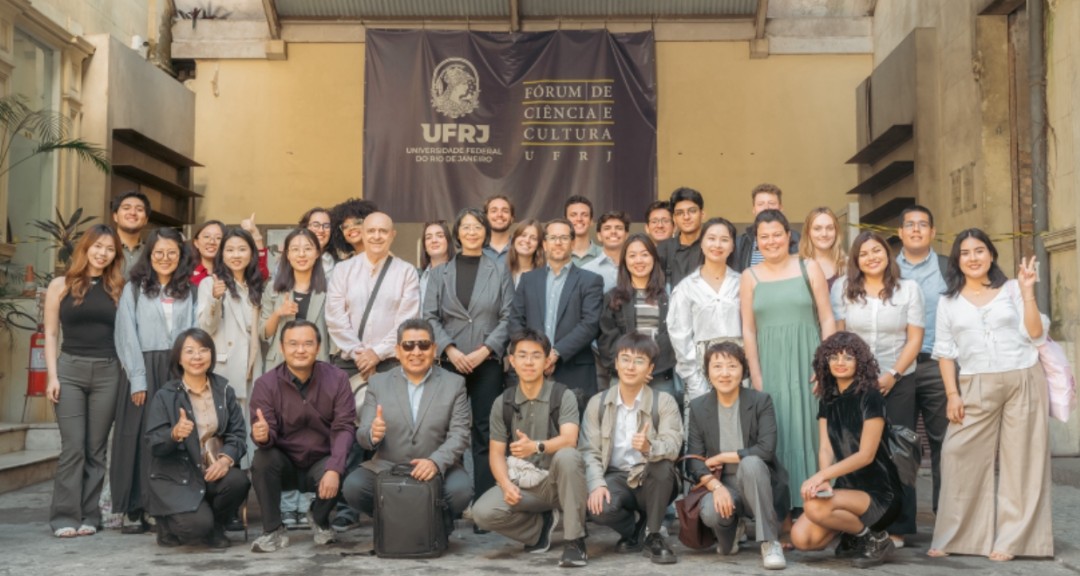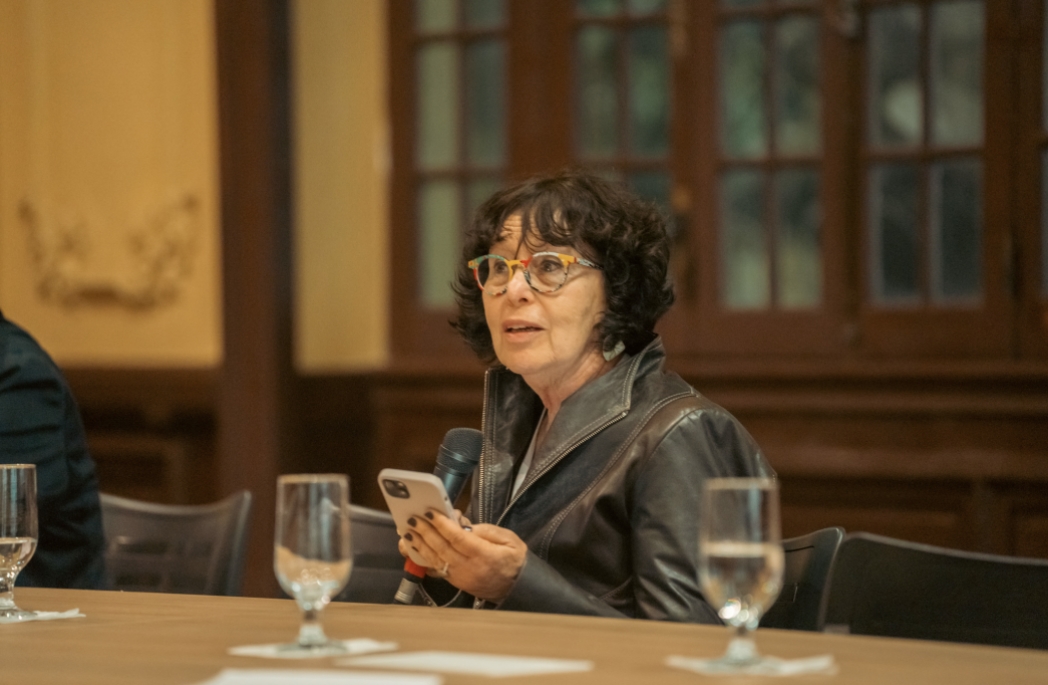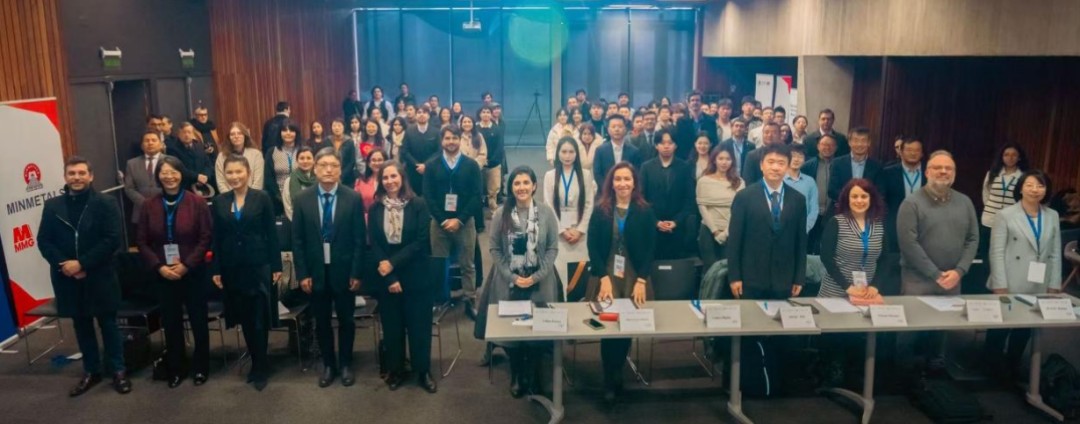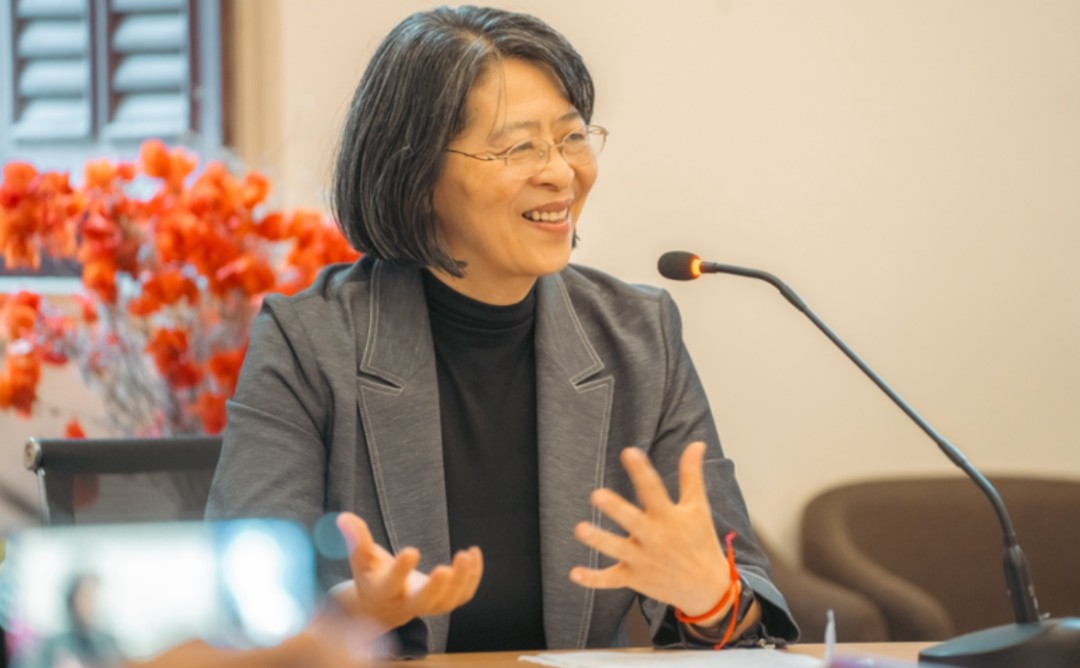In August 2025, the finals of the China–Latin America Youth Responding to Global Challenges – 2025 Poverty Alleviation Challenge were successfully held in Brazil and Chile. After intense competition, 12 youth teams advanced to the finals from an initial pool of 102 teams representing 27 universities and enterprises across China, Brazil, Chile, and Peru. The international stage featured ice-breaking, field research, seminars, mentoring, and project design and presentations. Students from different countries engaged in cross-disciplinary and cross-cultural explorations focused on poverty alleviation and sustainable development.

Group picture from the Tsinghua University preliminary round of the 2025 Poverty Alleviation Challenge
The 2025 Challenge was co-hosted by Tsinghua University, Universidade Federal do Rio de Janeiro, Pontificia Universidad Católica de Chile, Universidad de Chile, Universidad del Pacífico, and Minera Las Bambas S.A. The event was supported by the Chinese Embassy in Brazil, the Chinese Consulate in Rio de Janeiro, the Brazilian Embassy in China, the Chinese Embassy in Chile, the Chilean Embassy in China, and the Chinese Embassy in Peru. Leading domestic and international enterprises—including Envision Group, CGE, Minera Las Bambas S.A, Kuaishou International Business (KSlB), and China Mobile International (Chile)—served as sponsors, ensuring the smooth delivery of the event.
Since its inaugural edition in 2024, the Poverty Alleviation Challenge has grown into a major platform for government–industry–academia collaboration between China and Latin America, with universities at its core. In November 2024, during Chinese President Xi Jinping’s visit to Brazil for the G20 Summit, Tsinghua University Party Secretary Qiu Yong and the President of Universidade Federal do Rio de Janeiro signed a cooperation agreement on the China–Latin America Youth Responding to Global Challenges initiative. This agreement was included in the official outcomes of President Xi's visit, marking as an example of China-Latin America collaboration.
From August 13 to 15 (Brazil time), the Brazil finals of the 2025 Challenge took place at Universidade Federal do Rio de Janeiro. Six finalist teams presented diverse solutions on topics such as renewable energy, agricultural innovation, industrial upgrading, and social equity, integrating their disciplinary expertise and cross-cultural perspectives. The champion team, “Sol Verde” from Tsinghua University, focused on addressing the needs of Brazil’s Sertão region by promoting an “agrivoltaics” system. By combining agricultural production with photovoltaic power generation, the project enhances land-use efficiency, creates new income streams, and strengthens local communities’ resilience to climate change, thereby contributing to poverty alleviation.

Group picture from the Brazil finals of the 2025 Poverty Alleviation Challenge
Brazilian Ambassador to China, Marcos Galvão, delivered remarks via video. He noted that it was inspiring to see young students from Brazil, China, Chile, and Peru bringing together wisdom and passion to propose innovative solutions for building a more just and inclusive world. Youth are a vital force for advancing poverty alleviation and sustainable development. He hopes that participants would turn their competition experience into concrete action, promoting cross-cultural cooperation and contributing to global development.
Xing Wenju, Minister at the Chinese Embassy in Brazil, also addressed the event via video. He highlighted the broad prospects for China–Latin America cooperation in poverty alleviation and sustainable development. Poverty eradication is a mission for all humanity, the Global South should unite to meet these challenges. He encouraged young participants to transform their experiences and spirit of cooperation into sustained engagement, dedicating themselves to national development, global poverty alleviation, and the advancement of China–Latin America friendship and collaboration.
Tian Min, Consul General of Chinese Consulate in Rio de Janeiro, remarked that this event brought together young people from multiple countries across China and Latin America. While the world has made remarkable progress in science, technology, and human civilization, it continues to face serious global challenges such as geopolitical conflicts, climate change, and poverty. As the most dynamic and responsible generation, youth shoulder a major responsibility in addressing these issues.
Yang Bin, Deputy Director of Tsinghua University Council, stated in his address that the China–Latin America Youth Responding to Global Challenges is a pioneering initiative. During President Xi Jinping’s visit to Brazil in 2024, the memorandum of understanding signed between Tsinghua University and Universidade Federal do Rio de Janeiro was included in the list of achievements of the state visit. This year, the Beijing Declaration of the Fourth Ministerial Meeting of the China–CELAC Forum further called for deepened cooperation and exchanges in poverty alleviation, providing strong support for the Challenge to expand its influence across Latin America and beyond.
Envision Group, a sponsor and corporate partner of the Poverty Alleviation Challenge, was represented by its Senior Account Manager, Lucas Donasolo. He remarked that it was inspiring to see young students transform creativity and teamwork into concrete action. He noted that Envision Group, as a global leader in green technology with operations spanning five continents, has developed wind farms in Latin America and been planning to build Brazil’s first zero-carbon industrial park. Partnering with universities is a key initiative for the Envision Group to promote sustainable community development.
Oscar Gaggero, Superintendent Domestic Corp. Affairs at Minera Las Bambas S.A., emphasized that as one of Peru’s largest copper producers, Las Bambas is committed to transforming mineral resources into opportunities for community development and sustainable progress. Through projects in education, healthcare, and economic development, the company seeks to improve social well-being. He highlighted that poverty alleviation requires close collaboration among industry, academia, and communities—a principle embodied by the Poverty Alleviation Challenge. Las Bambas, he affirmed, will further strengthen its cooperation with the initiative to contribute wisdom toward a fairer and more prosperous future.
Ana Célia Castro, Senior Fellow at the Brazilian Center of International Relations (CEBRI), Director of the Institute for Advanced Studies at Universidade Federal do Rio de Janeiro, and president of the Brazilian Forum for Advanced Studies, stressed the importance of the project’s implementation. She encouraged the teams to continue expanding the scope of cooperation and to engage more stakeholders, in order to drive the practical realization of poverty alleviation projects.

Remarks by Prof. Ana Célia Castro
From August 20 to 22 (Chile time), the finals of the 2025 Poverty Alleviation Challenge were held in Santiago, Chile. Six finalist teams presented solutions on topics including clean energy utilization, agricultural and water resource innovation, industrial upgrading and community development, and digital platforms for employment. The championship went to “Shining Micro-Dreams”, a team composed of students from Universidad de Chile and Tsinghua University. Their proposal addressed drinking water safety in remote rural areas of Chile by using small-scale photovoltaic systems to power water collection and purification facilities, while transforming local water stations into spaces for community interaction and information sharing—combining technical feasibility with social sustainability.

Group picture from the Chile finals of the 2025 Poverty Alleviation Challenge
Chilean Ambassador to China, Pablo Arriarán Ahumada, delivered remarks via video. On behalf of the Chilean Embassy in China, he warmly congratulated the successful holding of the event and spoke highly of this youth exchange initiative. He emphasized that the finals coincided with the 55th anniversary of diplomatic relations between China and Chile, giving the event special significance. He encouraged young participants to use academic exchange and cooperation as a foundation for shaping more effective public policies in the future.
Niu Qingbao, Chinese Ambassador to Chile, also addressed the finals via video. On behalf of the Chinese Embassy in Chile, he extended best wishes for the success of the event. He noted that China–Latin America youth had proposed innovative poverty alleviation solutions with wisdom and passion, showcasing creativity and a strong sense of responsibility while injecting “youth power” into the global poverty alleviation cause. With broad prospects for cooperation in poverty alleviation and development, youth should serve as vital bridges fostering mutual learning and deeper cultural exchange between China and Latin America.
Dai Yan, President of CGE, highlighted the company’s active role in fulfilling corporate social responsibility, citing initiatives such as rural microgrid demonstration projects and the “Ilumina” public-benefit program. He expressed hope that more young people, through the Challenge, would gain deeper understanding of CGE and join hands in advancing energy transition and sustainable development.
Liu Shuai, Country Deputy Head of China Mobile International (Chile), remarked that in China, AI has already been widely applied in areas such as agricultural forecasting, remote education, and disaster relief. In Latin America, he noted, youth teams are also innovating to harness AI as a tool for poverty alleviation. He stressed that poverty is not a lack of resources but a lack of access to solutions—and that young people are the key force driving this transformation.
Maria Montt, Vice President for International Affairs at Pontificia Universidad Católica de Chile, emphasized that in the face of global challenges, international cooperation is essential. She noted that through cross-cultural exchange, young people can bring diverse perspectives and stimulate innovative thinking, thereby contributing sustainable solutions to global poverty alleviation. She encouraged participants to seize this opportunity to showcase their creativity and abilities.
Alicia Salomone, Director of the Office of International Relations at the Universidad de Chile, stressed that addressing multidimensional poverty requires interdisciplinary and collaborative approaches. She highlighted that poverty alleviation is a shared responsibility and encouraged youth to maintain and pass on the spirit of cooperation and shared experiences, further advancing cross-cultural exchange and sustainable development.
During the finals, experts and scholars from China, Brazil, and across Latin America served as mentors and judges.
Chen Jianguo, Deputy Director of the Teaching Committee at School of Safety Science and Director of the Institute of National Security, Tsinghua University, noted that China and Latin America share strong similarities in disaster risk prevention and control. He suggested strengthening collaboration among universities, research institutes, and enterprises to jointly explore pathways of reducing poverty through disaster reduction.
Shao Lei, Director of Institute for Accessibility Development, Tsinghua University, called for deeper China–Latin America cooperation to promote the localized application of AI technologies, transforming the challenge of poverty into a virtuous cycle of dignity, capability, and opportunity.
Liu Jian, Professor at School of Architecture, Tsinghua University, pointed out that around 3 billion people globally live in underdeveloped communities, making it crucial to build inclusive neighborhoods, ensure equitable access to public services, and enhance residents’ sense of participation and belonging.
Cai Lining, Associate Professor of the Department of Industrial Engineering and Deputy Director of MEM Education Center, Tsinghua University, emphasized that deep learning AI applications are closely aligned with poverty alleviation needs. He underscored the roles of governments, enterprises, and universities in building AI ecosystems and empowering society. While AI holds great promise, he cautioned that the technology is not yet fully mature and requires sustained exploration and practice.
Vitor Libanio, Social Responsibility Analyst at Vale, highlighted the complexity of poverty and the need for multi-level collaboration among governments, enterprises, and academia. He stressed that combining corporate social responsibility initiatives with public policy can generate sustainable poverty alleviation outcomes.
Chen Taotao, Professor of School of Economics and Management (SEM), Tsinghua University, Director of the Tsinghua University Latin America Center, and Director of the Research Center for China-Latin America Management Studies at Tsinghua University SEM, observed that the Poverty Alleviation Challenge is not only an opportunity for China–Latin America youth to confront real-world challenges, but also an important platform to promote mutual learning and expand avenues of cooperation. She stressed that the core goal of the initiative is to enhance students’ global competence, foster cross-cultural exchange, and narrow gaps in poverty alleviation across countries. Looking ahead, she expressed the hope that the project would expand to more countries, engaging institutions and individuals who share common values.

Remarks by Prof. Chen Taotao
Media Contact
Company Name: Tsinghua University Latin America Center
Contact Person: Qiao Ziyi
Email: Send Email
Country: China
Website: https://lac.tsinghua.edu.cn/gywm/zxjj.htm






